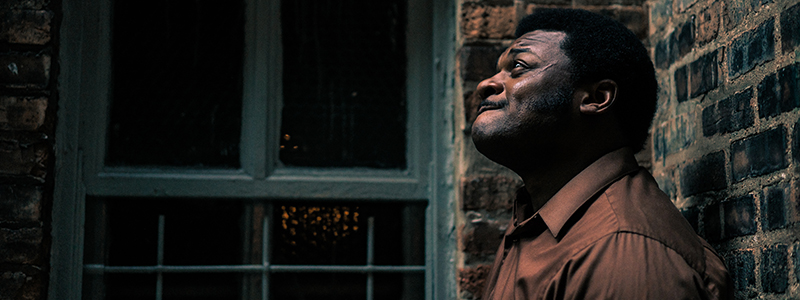The Life Behind the Sentence

King Hedley II, like any great work of art, raises issues that are broad, deep, and universal: can people ever escape their past? Can love triumph over betrayal? What is religious faith in the face of relentless misfortune? What does it mean to be a real man?
But King Hedley II also raises issues that are specific to the life of African American people in 20th century America. It delves into one of the central, beating issues for racial justice in 21st century America, too: the enduring inequities of our criminal justice system.
King has recently returned from seven years in prison as the play opens, but we sense that he still lives in confinement. His options seem constrained not only by his criminal past—he’s plainly guilty of the crime for which he did time—but by the code of honor that governs behavior in Pittsburgh’s Hill District. “They got everything stacked up against you as it is,” says King. And “they” seems to stand for the world at large.
But King is also noting a trend in social policy that quickly spun out of control. By the mid-1980s, when this play is set, mass incarceration was already on the rise. When Ronald Reagan took office, the total prison population was 329,000. By the time he left eight years later, it had nearly doubled to 627,000. He declared a “war on drugs,” warned of a “crack epidemic,” and signed into law a federal Anti-Drug Abuse Act that established mandatory minimums for drug offenses for the first time. That ominous legislation would soon fill America’s prisons and jails with young men of color.
It also kept them there: in the mid-1980s, more than half of the people getting out of prison were rearrested within the first year. Even today, more than two million people are living behind bars in this country—but more than seven million live under some form of supervision, such as probation or parole. And a shocking 70 million Americans have some kind of criminal record.
The world of crime and punishment pulls inexorably on King Hedley II. Though we, the audience, never see a police officer on stage, we feel their threatening presence looming over the characters. Ruby insists that “the police gonna find out” if King transgresses, because “the police know everything.” King retorts that the police “ain’t found out who killed Little Buddy Will” or who committed arson in the neighborhood. This interchange should ring true to audiences at Court Theater: the Chicago Police Department’s rate of solving murders remains stubbornly below 20 percent.
Law professor Michelle Alexander argues that the so-called “war on drugs” is a thinly-veiled attempt to perpetuate slavery and white racial dominance, using the tool of criminal justice to control and suppress black people. Her book, The New Jim Crow, has become a top seller in recent years. But the racism entrenched in every aspect of the criminal justice system was nothing new to the people of Pittsburgh’s Hill District. “If a burglar break into a white man’s house to steal his TV and the white man shoot him they don’t say he wrong,” says King. “They pat him on the back and tell him to go on home.”
Public opinion about criminal justice is shifting today. Prison populations have fallen by about 10 percent in the last decade, and in 2018 the US Congress passed the first significant criminal justice reform bill in decades. Both Republicans and Democrats speak of the need for reform. The issue arises in presidential debates, where candidates hasten to criticize their rivals’ support for harsh criminal justice policies in the past. The proportion of African-American people in the prison population has fallen slightly in recent years. That’s good. But in order to match the incarceration rate for whites, it will have to keep sinking at the current rate for another 100 years. That’s the deeper truth that August Wilson wants us to see.
Carroll Bogert is president of The Marshall Project. Bogert was previously deputy executive director at Human Rights Watch, running its award-winning global media operations. Before joining Human Rights Watch in 1998, Bogert spent twelve years as a foreign correspondent for Newsweek in China, Southeast Asia, and the Soviet Union.
Photo of Kelvin Roston, Jr. by Joe Mazza.